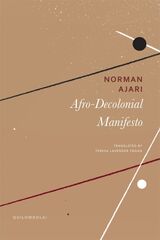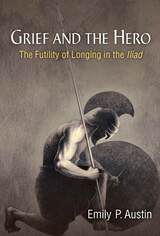
Grief and the Hero examines Achilles’ experience of the futility of grief in the context of the Iliad’s study of anger. No action can undo his friend Patroklos’ death, but the experience of death drives him to behave as though he can achieve something restorative. Rather than assuming that grief gives rise to anger, as most scholars have done, Grief and the Hero pays close attention to the poem’s representation of the origin of these emotions. In the Iliad, only Achilles’ grief for Patroklos is joined with the word pothê, “longing”; no other grief in the poem is described with this term. The Iliad depicts Achilles’ grief as the rupture of shared life—an insight that generates a new way of reading the epic. Achilles’ anguish drives him to extremes, oscillating between self-isolation and seeking communal expressions of grief; between weeping abundantly and relentlessly pursuing battle; between varied threats of mutilation, deeds of vengeance, and other vows. Yet his yearning for life shared with Patroklos is the common denominator. Here lies the profound insight of the Iliad. All of Achilles’ grief-driven deeds arise from his longing for life with Patroklos, and thus all of these deeds are, in a deep sense, futile. He yearns for something unattainable—undoing the reality of death. Grief and the Hero will appeal not only to scholars and students of Homer but to all humanists. Loss, longing, and even revenge touch many human lives, and the insights of the Iliad have broad resonance.
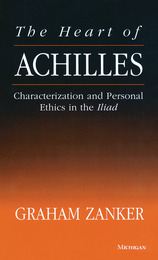
"[Zanker] investigates altruistic behavior in the epic with professional sophistication but in a way that makes his investigation available to a wide audience from undergraduates to advanced scholars. . . . [A] very useful interpretative study." --Choice
Graham Zanker is Senior Lecturer in Classics, University of Canterbury, New Zealand.
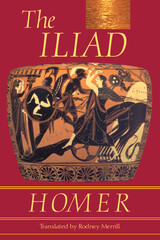
nuances of English."
---Stephen G. Daitz, Professor Emeritus of Classics, City University of New York
Rodney Merrill's translation of Homer's Iliad offers a form of English poetry particularly relevant to the epic, producing a strong musical setting that brings many elements of the narrative truly to life. Most notable are the many battle scenes, in which Homer's strong dactylic hexameters make credible the "war-lust" in the deeds of the combatants.
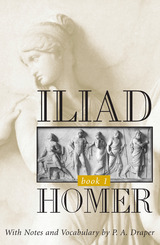
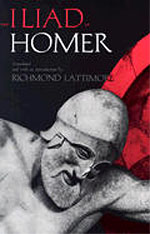
"Certainly the best modern verse translation."—Gilbert Highet
"This magnificent translation of Homer's epic poem . . . will appeal to admirers of Homer and the classics, and the multitude who always wanted to read the great Iliad but never got around to doing so."—The American Book Collector
"Perhaps closer to Homer in every way than any other version made in English."—Peter Green, The New Republic
"The feat is decisive that it is reasonable to foresee a century or so in which nobody will try again to put the Iliad in English verse."—Robert Fitzgerald
"Each new generation is bound to produce new translations. [Lattimore] has done better with nobility, as well as with accuracy, than any other modern verse translator. In our age we do not often find a fine scholar who is also a genuine poet and who takes the greatest pains over the work of translation."—Hugh Lloyd-Jones, New York Review of Books
"Over the long haul Lattimore's translation is more powerful because its effects are more subtle."—Booklist
"Richmond Lattimore is a fine translator of poetry because he has a poetic voice of his own, authentic and unmistakable and yet capable of remarkable range of modulation. His translations make the English reader aware of the poetry."—Moses Hadas, The New York Times

The epic tale of wrath and redemption.
Here is a new Loeb Classical Library edition of Homer’s stirring heroic account of the Trojan war and its passions. The eloquent and dramatic epic poem captures the terrible anger of Achilles, “the best of the Achaeans,” over a grave insult to his personal honor and relates its tragic result: a chain of consequences that proves devastating for the Greek forces besieging Troy, for noble Trojans, and for Achilles himself. The poet gives us compelling characterizations of his protagonists as well as a remarkable study of the heroic code in antiquity.
The works attributed to Homer include the two oldest and greatest European epic poems, the Odyssey and Iliad. These texts have long stood in the Loeb Classical Library with a faithful and literate prose translation by A. T. Murray. William F. Wyatt has brought the Loeb’s Iliad up to date, with a rendering that retains Murray’s admirable style but is worded for today’s readers. The two-volume edition includes an Introduction, helpful notes, and an index.

The epic tale of wrath and redemption.
Here is a new Loeb Classical Library edition of Homer’s stirring heroic account of the Trojan war and its passions. The eloquent and dramatic epic poem captures the terrible anger of Achilles, “the best of the Achaeans,” over a grave insult to his personal honor and relates its tragic result: a chain of consequences that proves devastating for the Greek forces besieging Troy, for noble Trojans, and for Achilles himself. The poet gives us compelling characterizations of his protagonists as well as a remarkable study of the heroic code in antiquity.
The works attributed to Homer include the two oldest and greatest European epic poems, the Odyssey and Iliad. These texts have long stood in the Loeb Classical Library with a faithful and literate prose translation by A. T. Murray. William F. Wyatt has brought the Loeb’s Iliad up to date, with a rendering that retains Murray’s admirable style but is worded for today’s readers. The two-volume edition includes an Introduction, helpful notes, and an index.


Achilles—warrior and hero—by the protocols of Western culture, should never cry. And yet Homeric epic is full of his tears and those of his companions at Troy. This path-blazing study by Hélène Monsacré shows how later ideals of stoically inexpressive manhood run contrary to the poetic vision presented in the Iliad and Odyssey. The epic protagonists, as larger-than-life figures who transcend gender categories, are precisely the men most likely to weep.
Monsacré pursues the paradox of the tearful fighter through a series of lucid and detailed close readings, and examines all aspects of the interactions between men and women in the Homeric poems. Her illuminating analysis, first published in French in 1984, remains bold, fresh, and compelling for anyone touched—like Achilles—by a world of grief.
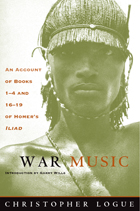
READERS
Browse our collection.
PUBLISHERS
See BiblioVault's publisher services.
STUDENT SERVICES
Files for college accessibility offices.
UChicago Accessibility Resources
home | accessibility | search | about | contact us
BiblioVault ® 2001 - 2025
The University of Chicago Press


